by Frank | Jan 29, 2017 | blog news, illustration, Uncategorized
Just a quickie to say that I’ll be drawing a humorous monthly column illustration about single parenthood by Jonathan Taylor in local lifestyle magazine Exeter Living. I’ve created plenty of magazine illustrations in my time but never before for a column so this is a wonderful new first for me – I can’t wait to see my work in the magazine & really excited about reaching a local audience.
by Frank | Jan 16, 2017 | housing co-op life
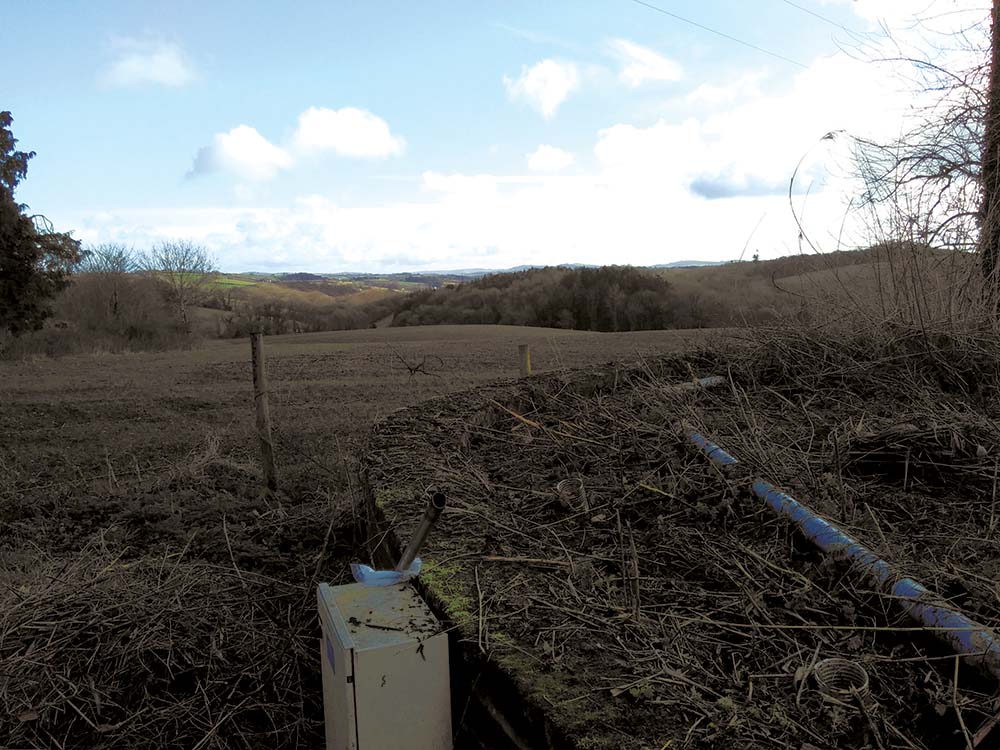
The reed beds in winter – the reeds have died down and will regrow in spring. The view is rather nice.
Housing co-op life: work
Another blog post about living in a community co-operative
I’ve started writing blog posts about living at Beech Hill Community Co-operative in Mid Devon, where I’ve been living since September 2016. People seem to like them so, well, I’ll keep going for now…
This one’s about work – specifically, the responsibilities entailed with living here.
It’s cheaper to live here than in the Real World and part of the reason for that is that a proportion of our rent is paid in labour. We’re supposed to contribute two days or 16 hours a week to the co-op, and it doesn’t really matter if that’s two and a bit hours a day, two full days in the week or a seven day week a month, as long as it gets done. No-one is counting your hours and it’s up to you to make sure you do them. There is always plenty to do here.
The Protestant Work Ethic vs Catholic Guilt (there are none practising here of either flavour to my knowledge but indoctrination sticks pretty hard)
People are very good at doing their allotted amount to the point of feeling guilty about taking time out and sitting in the sun reading a book while someone else walks past with a wheel barrow. I think that is probably the biggest problem here. People were feeling that they had to leave the site to have a break and damnit, we live in a picture-postcard manor house with glorious grounds and a camping paddock and a swimming pool and I want to enjoy it.
So at a co-op meeting I suggested – and got agreement for – the concept of a Beech Hill Holiday, which is when you take a week off from doing anything at all for Beech Hill and you announce this at the weekly meeting and so everyone knows you are on holiday and they don’t ask you to do things and you can lie around talking to the chickens and admiring the rooks and being grateful for living somewhere so glorious.
What work?
Much work, but very little of it *feels* like work.
Regular jobs for me include:
- Cleaning one of the bathrooms (we all sign up for various jobs & this is one of mine)
- Feeding the chickens at dawn (there are 3 people who do this, a week at a time)
- Moving wood from the outdoor storage bays into the boiler room (everyone does this in winter)
- Feeding the wood-fired boiler (everyone signs up for this & it needs doing twice a day in winter)
- Cleaning the boiler (me & one other person – once a month)
- Updating the website & facebook page (me)
- Watering the indoor plants (me)
- Cooking an evening meal (everyone – you cook once or twice a fortnight)
- Washing up (everyone – maybe once a week each)
- Weeding the reed beds (everyone)
- Checking the reed-bed sewage system is functioning (me & someone else)
- Putting the recycling out (me & someone else)
- Doing the accounts (me & two other people)
- Gardening (everyone)
- Painting & decorating (everyone – an occasional job)
- Maintenance (everyone – from painting a window frame to repairing a roof)
- Liaising with contractors – chimney sweep, electricians, plumbers etc (everyone)
- Releasing caught rats (me)
- Cleaning the main kitchen (two people every week)
- Buying food, tools or other things we need
- Attending meetings
There are loads of things other people do that I don’t – I’ve never mowed the lawns, for example. But these are things I have done. There’s probably more.
Work/life balance
It takes a good while to work out how you’re going to divide up your time. And you might want to divide up your time in different ways at different parts of the year. In May and June, when everything is growing, you might want to spend at least an hour every day in the polytunnels and veg patches. Owing to paid work and master’s commitments I did very little at the end of November and the first half of December, and then just before Yule I spent over a week wallpapering and painting a corridor.
And there are meetings, where Things are Decided. And you volunteer to do jobs at the meetings, and put your name down to do a certain thing at a certain time. You get very good at keeping a diary here. It can be hard work, and I wouldn’t like to be working full time and living here. Most people here work part-time, or are retired. Which is why it has to be cheaper to live here.
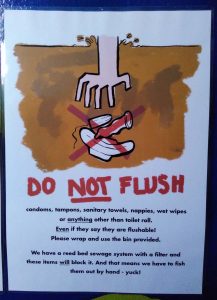
Our assertive signs. Designed and illustrated by you-know-who, with a nod to Saul Bass
The Shittiest Job
The worst thing I’ve done here was fixing the reed bed sewage pumps. Our reed beds, because they are not on enough of a slope, require pumps to get the liquid into the beds for filtering. If some utter, utter bastard ignores all the large assertive signs in the loos and flushes a condom, a tampon, a wet-wipe or basically anything other than what came out of their body and/or toilet roll, the filters for these two pumps gets blocked, seize up and trip a circuit board. The circuit board needs checking once a week and sorting if blocked or the sewage chambers fill up and can back up the system. Use your full and vivid imagination to work out what happens when our sewage system gets blocked and decides to back up.
The person who used to keep an eye on the reed bed circuit boards & pumps died at the end of October, so I volunteered to try it, on the condition that if it was like something out of a Korean horror film I could absolutely say fuck off I am not doing that again.
I bought some really long super-strength gloves and some masks that say they keep out bad smells, but this turned out to be a marketing lie. I pulled on overalls and another community member volunteered to help me, which was brilliant as I don’t think I’d have been strong enough to hover over the manhole to the sewage chamber and pull up the pumps, which hang from ropes inside the chambers. I probably could have done it but it might well have broken me, and nobody wants to be broken while lying next to a feculent void wearing an odour-preventing mask that tells basic marketing lies. He pulled up the pumps, we hosed them off and I unscrewed their bases and pulled out – not tampons, not sanitary towels, not wet-wipes but… beautiful mats of fat-covered hair. I screwed the bases of the pumps back on, we flicked the circuit board switch and both pumps buzzed into life, ready once more to obediently pump our shit.
But it wasn’t that bad, really, especially seeing as there was two of us doing it.
by Frank | Jan 16, 2017 | housing co-op life
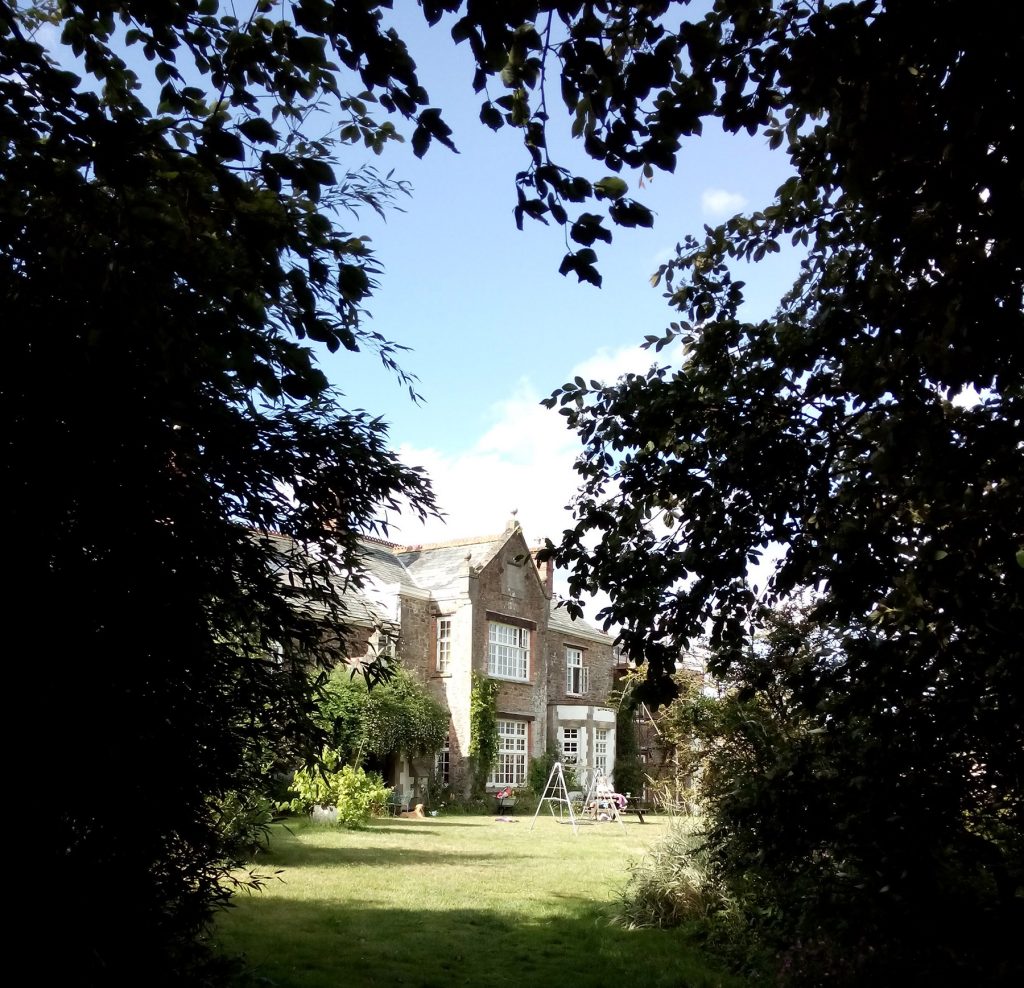 Interacting with Humans
Interacting with Humans
further housing co-op thoughts – this time on interacting with other humans
Straight off the bat I am going to tell you that I am a person who requires a good deal of time alone. Previous to moving to this rural housing co-op (Beech Hill, in mid Devon) I lived alone in Canton in Cardiff, purveying my graphic design and illustration to the masses from my little cave and now and again meeting friends for drinks in Chapter or the Lansdowne or some such. I need time to recover from, well, just life really, and all its stimuli. I do very much like being with people but there needs to be an equal or greater time away from people where I process things and also where the creativity percolates. I am your classic introvert from all those memes you have seen.
So to move to an intentional community would seem like a very silly thing to do, wouldn’t it?
When I was undergoing my test fortnight here community members would warn me that “it might seem like there’s a lot of us here but during the week it can get very quiet and sometimes there’s no-one here” and I would reply “that is perfect” grinningly. And that is how it’s turned out.

sometimes I get to wear amazing safety equipment which is a real plus
I can fester in my room doing paid work and painting skulls and reading Raymond Chandler and Jung and Judith Butler and cutting lino and floofing cats for a good deal of the time, and then I might pop down to the kitchen and there’ll be fresh baked bread and I’ll make myself toast and a cuppa and there’ll be someone else in the kitchen and we’ll have a chat about this or that and sometimes it’s just small talk and sometimes it’s today’s political horrors or whatever they’ve been up to or if I’ve won some new work. And then I return to my room and I feel good. I very rarely feel lonely and I very rarely feel overwhelmed. Even if it seems there’s a hundred people in the kitchen at mealtime including 47 rowdy kids I can take my plate and slope off to my room and nobody minds at all.
And then once a week we have a co-op meeting where we talk about what needs doing and how we’re going to achieve it, be it replacing some curtains or repairing the roof, but before the meeting we all talk a little about where we’re at and how we feel and you get people sharing some really profound news or feelings and sometimes it’s just “I went to the beach and had a lovely time” but it’s a space to catch up with people and really hear how things are going for them.
Death
At the end of October 2016 one of our community members died very suddenly. That evening we all gathered, including the children – maybe 15 of us sat in a circle as we do for a meeting – and one by one shared our thoughts about him and anecdotes and there were a lot of tears and maybe even more laughter than tears and it was beautiful and healthy and natural for us all to come together and share this laughter. I could not help but compare this evening with the evening my mother died and how isolating it felt – just me and my dad and my sister, my ex and her boyfriend sat there awkwardly, and staring at me when I resorted to dark humour – as is my wont in this sort of situation – as if I was being inappropriate. I need to laugh to access grief – and the fact that the community could all share stories and laugh and cry together was really affirming for me. It was at this point I realised on a feeling level that which I already knew intellectually – that humans evolved to live in community and it is good for us to do so – even miserable misanthropes like me.
Function
Obviously the community’s function depends on the individuals of that community, and it really does help that many of Beech Hill’s members have lived here a long time and are very used to living in community, and that other newer members have lived in community before and so they’re able to support and give advice. It is a bit like living in one big shared house, but with no arguments about whose turn it is to do the washing up or clean the bathroom, and with the collective responsibility of maintaining a rambling old manor house and its six acre estate. Honesty is really important – and seems very valued – here.
Disfunction
Of course there is conflict. But there really isn’t that much, and nobody here is deliberately a dick to anyone else. What you do see is how people’s personalities affect how they react to certain situations – how their subconscious mechanisms, their fears, prompt them to do or say certain things. So while someone’s behaviour might frustrate you occasionally you know it’s not really their conscious decision to be that way. I’ve learnt so much about human behaviour, including my own behaviour, and it’s really valuable.
 On my test fortnight here I looked very closely for aggression, manipulative behaviour and my personal pet hate, passive-aggressive behaviour. I found that everyone was very straightforward, including being straightforward about being annoyed with someone else, so it didn’t seem like anything was being hidden from me. If I inadvertently did something wrong this was pointed out gently. And recently, when I made a bigger fuck-up, I apologised fully and explained what I’d done and why and that I wouldn’t do it again, and people were good with that. No-one expects you to be perfect. Again, every community is going to be different so it’d be worth thinking about what you can and can’t live with and observing very closely at when visiting various communities.
On my test fortnight here I looked very closely for aggression, manipulative behaviour and my personal pet hate, passive-aggressive behaviour. I found that everyone was very straightforward, including being straightforward about being annoyed with someone else, so it didn’t seem like anything was being hidden from me. If I inadvertently did something wrong this was pointed out gently. And recently, when I made a bigger fuck-up, I apologised fully and explained what I’d done and why and that I wouldn’t do it again, and people were good with that. No-one expects you to be perfect. Again, every community is going to be different so it’d be worth thinking about what you can and can’t live with and observing very closely at when visiting various communities.
On my own disfunctions, I’ve found it easy and rewarding to be honest here. I said right from the start that I needed a lot of time to myself. Early on, after giving a grand tour of the place one morning to some visitors and being witty and generally performing, I suddenly realised I needed to hide under a duvet. I was supposed to be working alongside the visitors in the afternoon along with some other community members and I knew I couldn’t do this. So I told one of them and they were fine about it and I went and slept for the rest of the afternoon. People are very understanding here, I think especially if you can communicate what’s going on with you which is a thing I’m getting better at.
I think that I am good at being honest, and honest about what my requirements are, and good at hearing other people’s honesty (ie, I won’t hold it against them/react badly). And also I’m good at apologising when I get something wrong. I think these are all really important traits to develop if you’re thinking of living in community.
Outside the community
What I really miss about Cardiff is my amazing circle of friends. Living in a rural area – and being very busy a lot of the time, what with paid work, master’s work and community work – I find it especially difficult to make new friends. I have one very good friend 20 minutes’ drive away and there are some darned lovely folk on my master’s in Falmouth but it would be lovely to know more people locally. I guess that will come with time.
I can’t speak for every kind of personality but I am really enjoying living here at the moment and I really do feel that this is a better way for humans to live. It’s a big jump, and it’s worth visiting a lot of communities (look at Diggers & Dreamers) to find one that’s a good fit for you. I think it just might be the future.
by Frank | Jan 14, 2017 | housing co-op life
My life in a rural housing co-op – an occasional blog. Part one: animals


It was at the point of posting the second tweet above that I thought maybe I should be writing about my adventures. But before I explain these both, I ought to say where I am.
I’ve been living in Beech Hill in mid Devon since September 2015. It’s a rambling old manor house on 6 acres of land, with poly tunnels, a wind turbine, a swimming pool, Elizabethan walled gardens, a beech-lined camping paddock with compost toilets, a wood-fired gasification boiler, solar-heated water, chickens and, er, the occasional rattus norvegicus. The building and its grounds are owned in trust for the benefit of the co-op and can never be sold. Currently 11 adults live here with one adult child and three children, as well as five cats (two are mine) and one dog. All the co-op members meet once a week to make decisions by consensus. We generally eat together in the evening which means you cook once every week to two weeks and wash up around about the same amount. And yes, it really seems to work.
A lot of people ask me what it’s like to live here so I thought I’d write about it here and there and maybe you can build up a picture.
So where was I? ah yes, chickens.
Chicken whispering
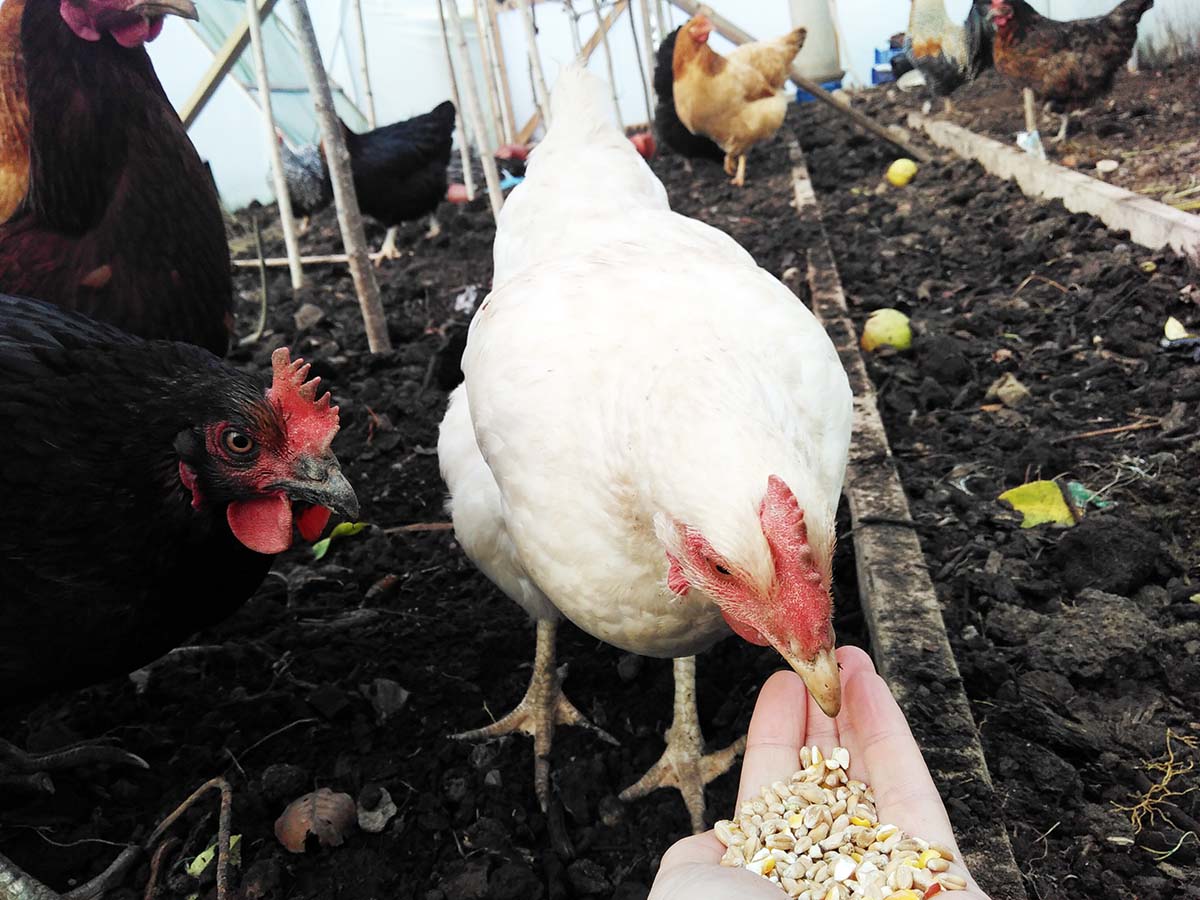 We have nine hens and a cockerel, apparently for eggs, (not the cockerel obviously) though we rarely get more than four eggs a day. Unlike in industrial-sized egg farms, including free range, we don’t kill our chooks when their productivity drops off, and some of them are rather elderly. They generally have the run of most of the grounds apart from when someone sees a fox on our land, when they are confined to a rather large run. There are three of us who take week-by-week turns to feed, muck out and collect eggs at dawn. I am vegan and don’t eat eggs but I bloody love chickens so I am one of the three that does this.
We have nine hens and a cockerel, apparently for eggs, (not the cockerel obviously) though we rarely get more than four eggs a day. Unlike in industrial-sized egg farms, including free range, we don’t kill our chooks when their productivity drops off, and some of them are rather elderly. They generally have the run of most of the grounds apart from when someone sees a fox on our land, when they are confined to a rather large run. There are three of us who take week-by-week turns to feed, muck out and collect eggs at dawn. I am vegan and don’t eat eggs but I bloody love chickens so I am one of the three that does this.
One morning, on opening the door to the chicken house, I saw that my favourite chicken (the white one eating out of my hand in the picture above) had been taken very ill. She couldn’t stand up and didn’t want to move and she seemed like she was in a lot of pain. I dropped everything, put her in a cat carrier and rushed her to the vets, assuming she was eggbound, meaning they get an egg stuck and cannot lay it and also cannot shit which is horrible and probably the worst way I can think of to die.
At the surgery the brave and dedicated vet inserted a begloved finger into the hen’s intimate area and felt around for a bit. She couldn’t really work out what was wrong, but then the hen did a loud squawk, an impressive amount of guano was evacuated, and the chicken perked up. I drove the bird back and she seemed fine.
Owing to there being incidences of bird flu, Defra, in their infinite wisdom, have made it a legal requirement that everyone who keeps fowl must now keep them under cover or face a £5000 fine. This is in no way to prevent insurance claims for dead birds by industrial chicken farms and has everything to do with animal welfare. We initially decided to cover one of our runs with black plastic left over from fixing the swimming pool but it was horrible and dark and when the wind blew the plastic the chickens were terrified of the flapping and the noise. So we decided to herd the chickens to a polytunnel and lock them in there, where they would be warm, dry, have lots of weed seeds and pest bugs to eat and where they would fertilise the soil. Brilliant!
Herding chickens: an odyssey
But have you ever tried to herd chickens? These descendants of T. Rex, with brains the size of a marble, can outwit any damn homo sapien you like and that is a stone-cold fact. I think in total it took about an hour to manage to get all of them the 20 metres to the polytunnel.
Cleverly, this homo sapien didn’t lock the polytunnel properly and when a big snowstorm came in the door banged open. And all the chooks got out and homed themselves in the evening to their old house. Another community member went to check on them after our weekly co-op meeting and returned to say that the white chicken (my favourite) was looking ill.
Thus we come to the moment, approaching midnight, with freezing temperatures and the snow coming in sideways, when I trudged out to the hen house to find my lovely hen in a similar position as before. I picked her up and felt her belly and it was hot and swollen. I gave it a good massage, reluctant to stick my untrained and ungloved finger into her intimate area (cowardly, I know) and after a while a goodly amount of particularly rancid faeces was ejected. She perked up a bit, and the next morning she was bright and happy and ready to spend another hour outwitting humans on the way to the polytunnel.
(after the first fun of herding I suggested we picked them up and carried them out at night when they’re sleepy and calm but I guess my other co-op members just really enjoy herding)
Rats

Brown rat by Jean-Jacques Boujot on Flickr
Rats are a reality of living in the country and that is another stone-cold fact. They’re not a problem in summer, but in winter find their way into the little nooks and crannies of this 16th Century (maybe) house and keep themselves nice and toastie with our central heating.
The previous thing to do was to call a man who would put a whole bunch of poison down and kill the rats. I was a) uncomfortable with killing them and b) of the opinion that if they had to be killed, the way to do it was not with poison, which ends up killing off our raptors. It’s a serious problem – so much so that the Barn Owl Trust has written a whole list of rat control methods in order of preference. (and yep, we are considering a jack russell!
I brought the whole rat-poison-is-poisoning-birds-of-prey issue up at a weekly meeting and we agreed that poison should be our last line of defence. I would order a live trap and be responsible for dealing with the critters.
When, inevitably, someone complained that they had a rat in their kitchen, I smeared the trap in compost and used gloves to set it (rats are smart-as and won’t trust things that smell of humans) and left it in a kitchen cupboard where it had been heard. On the second night we caught it (it had already tripped another death-trap that someone else had set and nicked the bait – I told you they were smart) and thus this morning I drove the terrified critter a few miles away to a deserted spot and released it into a hedgerow.
It might die anyway, being away from its territory, but at least it won’t poison an owl in doing so.
I think my community members think I’m a bit soft, but I don’t mind. I like rats – I lived with pet rats in college and tame they make the most wonderful, intelligent, affectionate pets. And I’d just rather not hurt things if I can possibly help it. I’ve set the trap again, because there’s rarely only one rat, and stuffed balled chicken wire into any holes in the building in the area that the little critters could use for a point of entry.
So those are some of the responsibilities of living in a housing co-op. And in between all this I do a bit of graphic design and illustration…
by Frank | Jan 13, 2017 | prints
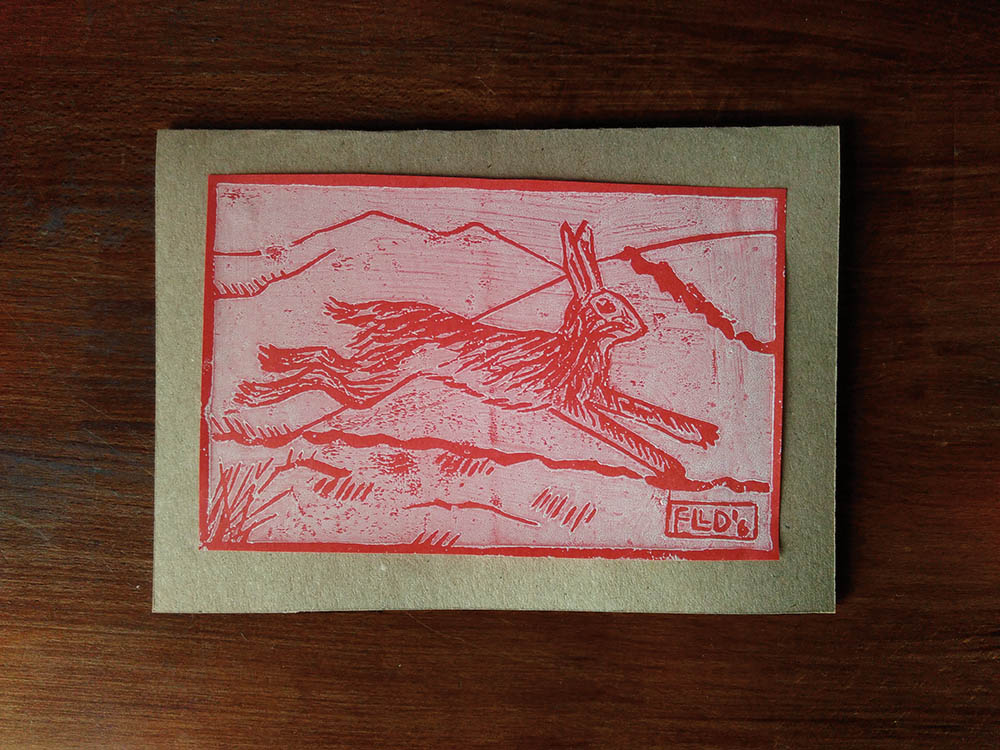
I can’t believe I haven’t shared this before now – my first ever linocut print, which I made at home without the aid of a press and which I used as my yule card! I would have liked the white to have been a bit more opaque – it’s all a learning curve! But I learnt a lot from it and I’m rather pleased with it. It’s not perfect, but it has its charm!



 Interacting with Humans
Interacting with Humans
 On my test fortnight here I looked very closely for aggression, manipulative behaviour and my personal pet hate, passive-aggressive behaviour. I found that everyone was very straightforward, including being straightforward about being annoyed with someone else, so it didn’t seem like anything was being hidden from me. If I inadvertently did something wrong this was pointed out gently. And recently, when I made a bigger fuck-up, I apologised fully and explained what I’d done and why and that I wouldn’t do it again, and people were good with that. No-one expects you to be perfect. Again, every community is going to be different so it’d be worth thinking about what you can and can’t live with and observing very closely at when visiting various communities.
On my test fortnight here I looked very closely for aggression, manipulative behaviour and my personal pet hate, passive-aggressive behaviour. I found that everyone was very straightforward, including being straightforward about being annoyed with someone else, so it didn’t seem like anything was being hidden from me. If I inadvertently did something wrong this was pointed out gently. And recently, when I made a bigger fuck-up, I apologised fully and explained what I’d done and why and that I wouldn’t do it again, and people were good with that. No-one expects you to be perfect. Again, every community is going to be different so it’d be worth thinking about what you can and can’t live with and observing very closely at when visiting various communities.

 We have nine hens and a cockerel, apparently for eggs, (not the cockerel obviously) though we rarely get more than four eggs a day. Unlike in industrial-sized egg farms, including free range, we don’t kill our chooks when their productivity drops off, and some of them are rather elderly. They generally have the run of most of the grounds apart from when someone sees a fox on our land, when they are confined to a rather large run. There are three of us who take week-by-week turns to feed, muck out and collect eggs at dawn. I am vegan and don’t eat eggs but I bloody love chickens so I am one of the three that does this.
We have nine hens and a cockerel, apparently for eggs, (not the cockerel obviously) though we rarely get more than four eggs a day. Unlike in industrial-sized egg farms, including free range, we don’t kill our chooks when their productivity drops off, and some of them are rather elderly. They generally have the run of most of the grounds apart from when someone sees a fox on our land, when they are confined to a rather large run. There are three of us who take week-by-week turns to feed, muck out and collect eggs at dawn. I am vegan and don’t eat eggs but I bloody love chickens so I am one of the three that does this.
